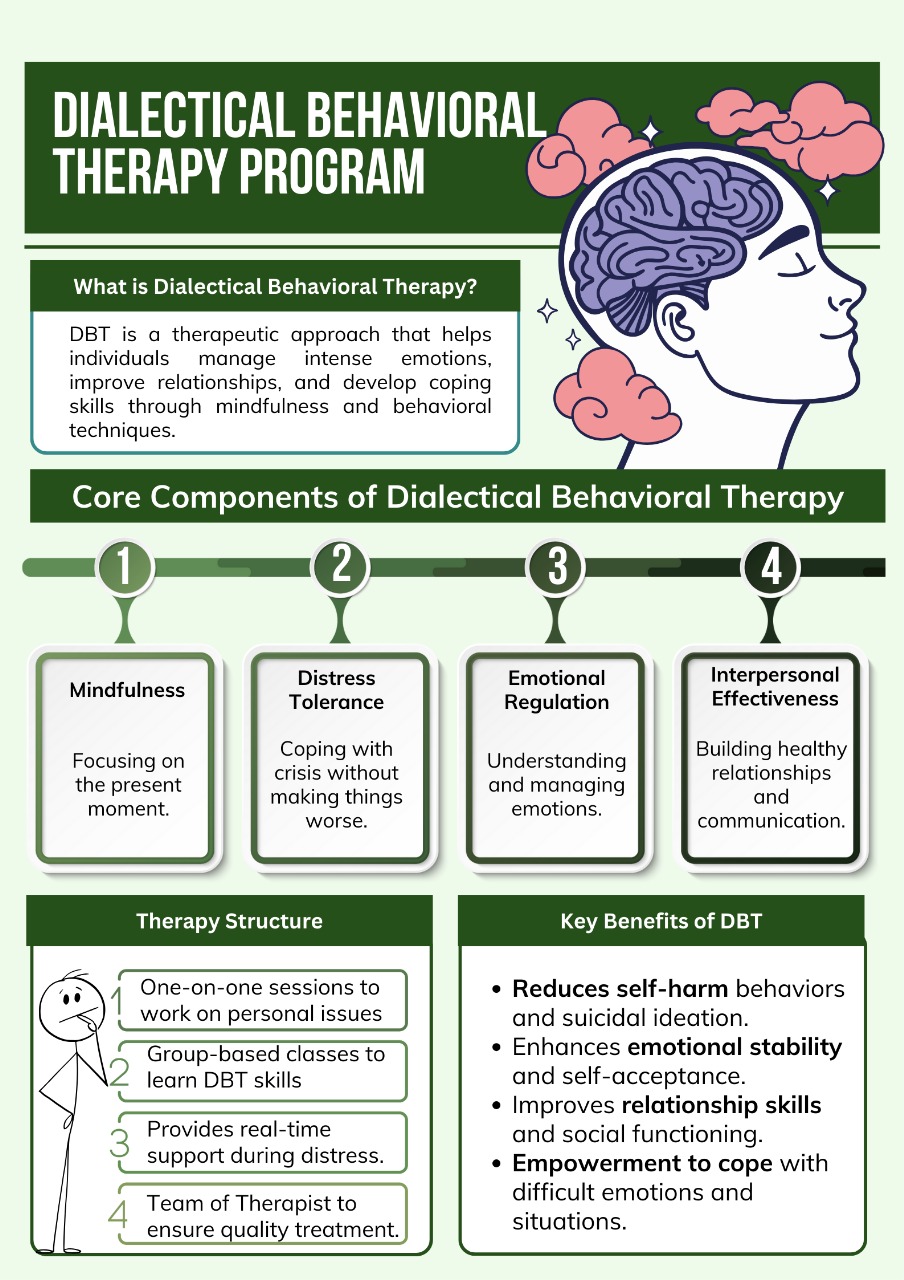How Are DBT and Medication Combined in Burlington’s Therapy Programs?

“Not all battles are obvious, and neither are all victories. Every move that you make toward your healing counts — especially the ones that no one else sees.”
Handling highs and lows of emotions can become very challenging. Even forcing you to accept that I can’t do it, or it’s over now. But wait, Forest Behavioral Health in Burlington can be your light of hope at the end of the tunnel.
Yes, you hear me right, as studies also show that 75 percent of people with borderline personality disorder end up showing real improvement after dialectical behavioral therapy, and 77 percent of people with suicidal tendencies show a marked reduction in symptoms if they participate in subjective teletherapy. It does so by smoothing the rough spots, with medication combined with dialectical behavioral therapy (DBT) helping those people to get well and regain their equilibrium more quickly.
If you feel weighed down by anxiety or mood swings, don’t worry —there are many Burlingtonians who have found solutions right in the city, and you can, too.
What Is DBT and Why Combine It with Medication?
Emotions can just be straight-up unruly — especially if you’re someone dealing with anxiety, depression, or addiction. Then when it’s not so good, Dialectical Behavioral Therapy (DBT) comes in. DBT arms Burlington locals with the tools to calm emotions, manage conflict and break destructive cycles.
In Forest Behavioral Health, clients explore mindfulness and resilience practices and learn to connect more effectively with others.
DBT’s Strengths
- Helps regulate strong, unpredictable emotions
- Develops enduring skills in relationships and problem-solving
- It’s here to teach you simple ways to deal with grief, anger, or guilt.
- Encourages self-respect and understanding
Why Mix DBT With Medication?
Sometimes, therapy alone can’t lift those mental health roadblocks. Medication can make the climb easier—reducing severe symptoms like panic, deep sadness, and mood swings.
Our approach at Forest Behavioral Health includes:
- Careful, one-on-one evaluations before prescribing any medicine
- Handpicked antidepressants, mood stabilizers, or antipsychotics when needed
- Continuous checks and team consultations so your plan stays fresh and safe
Pairing DBT with medication means quicker breakthroughs, steadier emotions, and real relief for people facing the toughest times. Every step is tailored, never copied, and always built around what will help most.
Choosing the Right DBT Program in Burlington
Wondering how Burlington’s DBT and medication programs compare?
Here’s a quick table showcasing the differences:
Criteria | DBT-Only Programs | DBT + Medication Programs |
Symptom Focus | Behavioral/Emotional | Behavioral/Emotional + Biological |
Treatment Team | Therapists | Therapists + Psychiatrists |
Flexibility | Skill Training | Skill Training + Dose Adjustments |
Ideal For | Mild/Moderate Issues | Complex/Severe Diagnoses |
The most effective programs—like those offered by Forest Behavioral Health—fuse both DBT and medication management, aiming to fill gaps traditional therapy might overlook.
Why This Integrated Approach Works in Burlington
For someone who needs medication in addition to DBT, here’s what Forest Behavioral Health clients receive:
- Quicker relief of difficult symptoms (such as panic attacks or severe mood swings)
- Realistic ways to deal with reoccurring daily stress
- Better chances at long-lasting recovery
Our programs, soundly evidence-based, are focused on mind, body, and spirit. Our clients meet with therapists, psychiatrists, and care managers—all under one roof to ensure progress is not interrupted.
DBT Skills Training at Forest Behavioral Health
Each DBT service at Forest Behavioral Health focuses on these 4 central modules:
- Mindfulness: Being in the present and living the moment.
- Distress Tolerance: learn how to tolerate the pain and other experiences you cannot change without making it worse.
- Manage Emotions: Adopt strategies to shift feelings and prevent mood swings.
- Interpersonal Effectiveness: Develop strong and healthy relationships and communicate needs directly.

Our Burlington centers run both group and individual skills sessions. Clients not only practice these skills in therapy—they get support using them in daily life. With medication, emotional spikes become less frequent, so people apply what they learn more effectively. Every person’s plan gets tweaked until it fits their exact challenges, making our therapy truly personalized.
Coordinated Care: Forest Behavioral Health’s Teamwork in Burlington
At Forest Behavioral Health, everyone on your care team communicates weekly. That means:
- Medication dosages get checked regularly.
- Therapists update treatment goals with psychiatrists.
- Family gets involved for extra support.
- Progress gets tracked, so relapse risks stay low.
Our structure helps clients move smoothly from intensive outpatient care to lighter programs when ready. Here, teamwork isn’t a buzzword—it’s the reason so many Burlington residents achieve real change.
Results That Speak for Themselves
Our Burlington programs consistently reduce self-harm, hospitalizations, and emotional breakdowns.
People who combine DBT with medication report:
- Better mood stability
- Stronger problem-solving skills
- Less risk of relapse
Turning Point: Burlington Success Story
Ms. A was a 22-year-old woman. She faced daily battles with mood swings and self-harm. After starting Kumamoto University Hospital’s DBT program and starting a prescribed antidepressant, things changed fast.
- Five months in, self-injury nearly stopped
- Mood swings settled down
- Friendships and family bonds got stronger
Outcome:
Peer-reviewed data confirms her symptoms faded, bringing new hope for her future.
Who Can Benefit from DBT and Medication in Burlington?
Forest Behavioral Health specializes in serving:
- Adults and teens with severe emotional instability
- People with chronic suicidal thoughts
- Those battling substance use alongside mental health issues
- Anyone stuck in cycles of crisis, conflict, or avoidance
Common Issues Treated
- Borderline personality disorder
- Major depression
- Anxiety disorders
- Eating disorders
- PTSD
- Looking for expert advice on choosing the top mental health support? Skip the guesswork—get clear, actionable tips in our blog “How to Find the Best Psychiatric Day Program in Massachusetts.”
Ready for Real Change? Contact Forest Behavioral Health Now!
In the end, blending DBT with medication at Forest Behavioral Health isn’t just treatment—it’s a real shot at reclaiming your life from the grip of emotional storms.
We’ve seen countless Burlington folks turn the corner, building resilience that sticks long after sessions end. It’s not always easy, but the wins add up, quiet and steady, leading to brighter days ahead.
Ready to take that step?
Reach out to Forest Behavioral Health today—call us or visit our site to start your personalized path to healing. Your stronger tomorrow starts with one conversation.
FAQs
What drugs are typically used along with DBT?
Some common options are SSRIs, mood stabilizers and antipsychotics (for seizures), but Forest Behavioral Health psychiatrists choose the best treatment for your individual case.
What types of conditions would necessitate both DBT and medication?
Those with extreme mood swings, chronic suicidal thoughts and complex co-occurring disorders typically benefit the most.
How is care coordinated?
Weekly team meetings ensure continuity, while regular progress reviews and family sessions anchor long-term recovery.
Will insurance cover DBT and medication?
Forest Behavioral Health accepts most major insurance plans and offers financial assistance for eligible clients.




